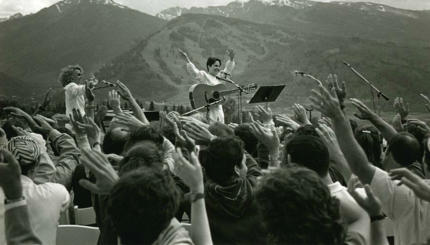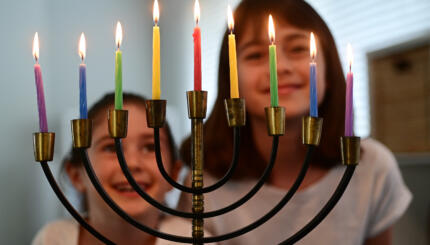This is the second of a two-part article about the life of famed cantor Yossele Rosenblatt. The first part ends with Rosenblatt, the most talented cantor of his day, turning down an offer to sing with the Chicago Opera. His refusal, ironically, lent him fame on a scale he hadn’t experienced previously, as described below. Reprinted with permission from Jewish Action, the magazine of the Orthodox Union.
Although the opera would be denied his talents, neither Rosenblatt nor his congregation saw any problem with his giving Jewish or secular music concerts. He aspired to be to the Jews “what John McCormack is to the Irish,” and was proud to be introduced as the Jewish tenor,” rather than the Russian, German, or Hungarian tenor. He rapidly learned some operatic arias and a repertoire of other ethnic songs, and in May 1918, gave his first recital at Carnegie Hall.
Rave Reviews
The reviews in the New York papers,all of which recapped his refusal to sing with the Chicago Opera, were mostly ecstatic. “Jewish Tenor Triumphs in Concert,” trumpeted the New York American, adding “Cantor Rosenblatt Reveals Voice of Exceptional Beauty, Evoking Thunderous Applause in Music Far from His Accustomed Field.” The Morning Telegraph said that his rendition of Verdi’s Questa o Quella “could scarcely have been excelled by any living tenor.”
Some critics, however, were less enthusiastic about his ventures into operatic arias, but all were swept away by the vocal agility he displayed when singing pieces of hazzanut [cantorial music] and Yiddish songs.

Help us keep Jewish knowledge accessible to millions of people around the world.
Your donation to My Jewish Learning fuels endless journeys of Jewish discovery. With your help, My Jewish Learning can continue to provide nonstop opportunities for learning, connection and growth.
From this point on, Rosenblatt was an integral part of the New York cultural scene, and the appearances of “Cantor Rosenblatt” were regularly listed in The New York Times, together with those of other celebrated artists of the day. His bookings were handled by well-known managers, including the foremost impresario Sol Hurok, who promoted him in advertisements in the Musical Courier alongside other world-famous artists such as Russian ballerina Anna Pavlova and Austrian pianist and composer Artur Schnabel.
In order to fight off offers from other congregations, Ohab Zedek was now paying Rosenblatt the record salary of $10,000 a year; Rosenblatt was also earning huge concert fees and royalties from his records. But as his income grew, so did his philanthropy and his generosity to various members of his family whom, in addition to his own eight children, he helped support. The many Jewish organizations that asked for his help were not only treated to a benefit concert but often also received donations out of his own pocket. And his home saw a constant procession of those in need, who knew that he would never turn them away empty-handed.
Vaudeville
But Rosenblatt was generous to a fault, and in 1922, he agreed to invest in a dubious Yiddish newspaper venture. However much he earned, the business demanded more, and in January 1925 Rosenblatt was forced to declare bankruptcy. So great was the public goodwill toward him that few questioned his sincerity when he announced that he would employ “the only gift left to me, of which nobody can deprive me–my voice,” to earn the money to pay back his creditors.
With this in mind, he began an exhausting series of appearances in vaudeville, then the most popular form of entertainment in America. Typically, the program would include the showing of a silent movie and a newsreel as well as various performers such as singers, acrobats, comedians, and child and animal acts. In order to distinguish his performance from the others with their gaudy scenery, props, and drum rolls, Rosenblatt, who was usually given top billing, insisted on appearing on a bare stage with all the auditorium lights on. He would sing a mix of sentimental songs such as “Keili, Keili” in Hebrew and Yiddish, “The Last Rose of Summer” in English, “Volga Boatmen” in Russian, and “La Campana” in Italian.
He was a sensation wherever he appeared throughout the country. Entertainers with whom he shared the bill were awed by this highly unusual “act.” A fellow performer in Cincinnati reported that when the cantor was finished singing, “without a nod or bow he turned towards the wings and walked…toward the stage door and out into the street.” Meanwhile, members of the audience were applauding madly and shouting for more. So great was the uproar that the manager had to lower the screen and show the newsreel in order to quiet them.
Jewish Challenges
Of course, some of the challenges Rosenblatt faced on tour were very different from those of other artists. Clearly, finding homes in which to eat was always a major priority. But he might, for example, be on a train on Purim, unable to reach a synagogue for ma’ariv [evening prayers] or shaharit [morning prayers], in which case he would read Megillat Esther [the scroll read on Purim] for himself from his own klaf (scroll).
Theater managers found themselves explaining why the headliner would not be appearing in the Friday evening and Saturday shows, and his itinerary had to be drawn up in a way that he could be at Ohab Zedek for all the Jewish holidays. In 1926, Rosenblatt resigned from the , accepting an offer of $15,000 to in a Chicago auditorium just for the High Holidays.
Hollywood Calls
In 1927, when Warner Brothers set about casting the first talking picture, The Jazz Singer, starring Al Jolson, Rosenblatt was the obvious choice to play Jolson’s father, the elderly hazzan. Despite the proffered remuneration of $100,000, he refused the role because it would have entailed singing Kol Nidrei in a make-believe setting. Contrary to popular belief, he would not even agree to dub the singing voice of Warner Oland, the actor who did play the hazzan.
Yet Rosenblatt’s fame was so great at this time that the producers were determined to have him take some part in the movie and prevailed on him until he agreed to appear as himself, singing a Yiddish song, “Yahrtzeit Licht,” in a concert setting.Despite his tiny role, “Cantor Rosenblatt” received star billing.
With vaudeville in decline, and tiring of not having his own synagogue in which to daven, Rosenblatt became the hazzan of Congregation Anshe Sfard in Borough Park, Brooklyn, in 1927. But after the stock market crash of 1929, Anshe Sfard was unable to pay him. He eventually returned to Ohab Zedek (now in its new home on West 95th Street), the only congregation that could still afford him. Yet this, too, did not last, and his financial situation became acute.
Then in 1933, he was offered a movie role that he could accept. The idea of the proposed production, Dream of My People, was for Rosenblatt to sing his own compositions at the biblical sites relevant to the words of those prayers. The movie was designed to show the Jews of America the Holy Land, with its sacred sites, newly built cities and settlements.
The producers felt they had a sure success on their hands; for Rosenblatt, visiting Eretz Yisrael [the Land of Israel] was the realization of a lifelong dream of his own. Besides working on the movie, Rosenblatt gave concerts and davened in the major shuls and yeshivot [Torah study academies] in Jerusalem, Tel Aviv, and elsewhere, enchanting all who heard him. He spent afternoons in the home of Rav Kook, the chief rabbi of what was then Palestine, who was deeply moved by his singing.
Among those who attended one of his concerts was the great Hebrew poet, Chaim Nachman Bialik. Hearing Rosenblatt sing his famous “Shir Hama’alot,”Bialik proposed that it become the national anthem of the Jewish people.
The Voice is Silenced
Rosenblatt decided to undertake a European concert tour to raise funds that would enable him to settle in Eretz Yisrael, as he and his wife had determined to do. On Shabbat, June 17, 1933, he davened at a “farewell” service held at the Hurva Synagogue in Jerusalem. The next day, after filming a scene at the Dead Sea, Rosenblatt suffered a sudden heart attack. Within a short while he died, at the tragically young age of 51.
More than 5,000 people attended his funeral on Har Hazetim, and scenes from the funeral were eventually included in the movie that he did not live to complete. Rav Kook gave the hesped [eulogy], and two of Rosenblatt’s most famous colleagues, Mordechai Hershman and Zavel Kwartin, sang.
A few days later in New York, some 2,500 stunned and mournful devotees attended a memorial service in Carnegie Hall. Two hundred of Rosenblatt’s fellow hazzanim assembled on the stage to sing his music and the Kel Malei Rachamim [a prayer for the dead].
Seventy years after his passing, Yossele Rosenblatt’s impact on hazzanut, in particular, and Jewish music, in general, continues to be felt. Many of his pieces have become staples in the repertoires of Ashkenazic hazzanim and are regularly sung in shul services and concerts. His recordings have been repeatedly reissued, most recently on CD. And still the greatest compliment that can be paid to any aspiring hazzan is that he is “a second Yossele.”
But there has been no second Yossele who has captured the hearts of the public quite the way he did. In shul, he gave voice to the deepest feelings and yearnings of those who entrusted him as their shaliah tzibbur [representative in prayer]. On the concert stage and in the theater, he would bring down the house night after night, impressing his audiences as much with his Yiddishkeit as with his artistry. In both settings, Yossele Rosenblatt created a kiddush Hashem [honor to God’s name] every time he sang.


